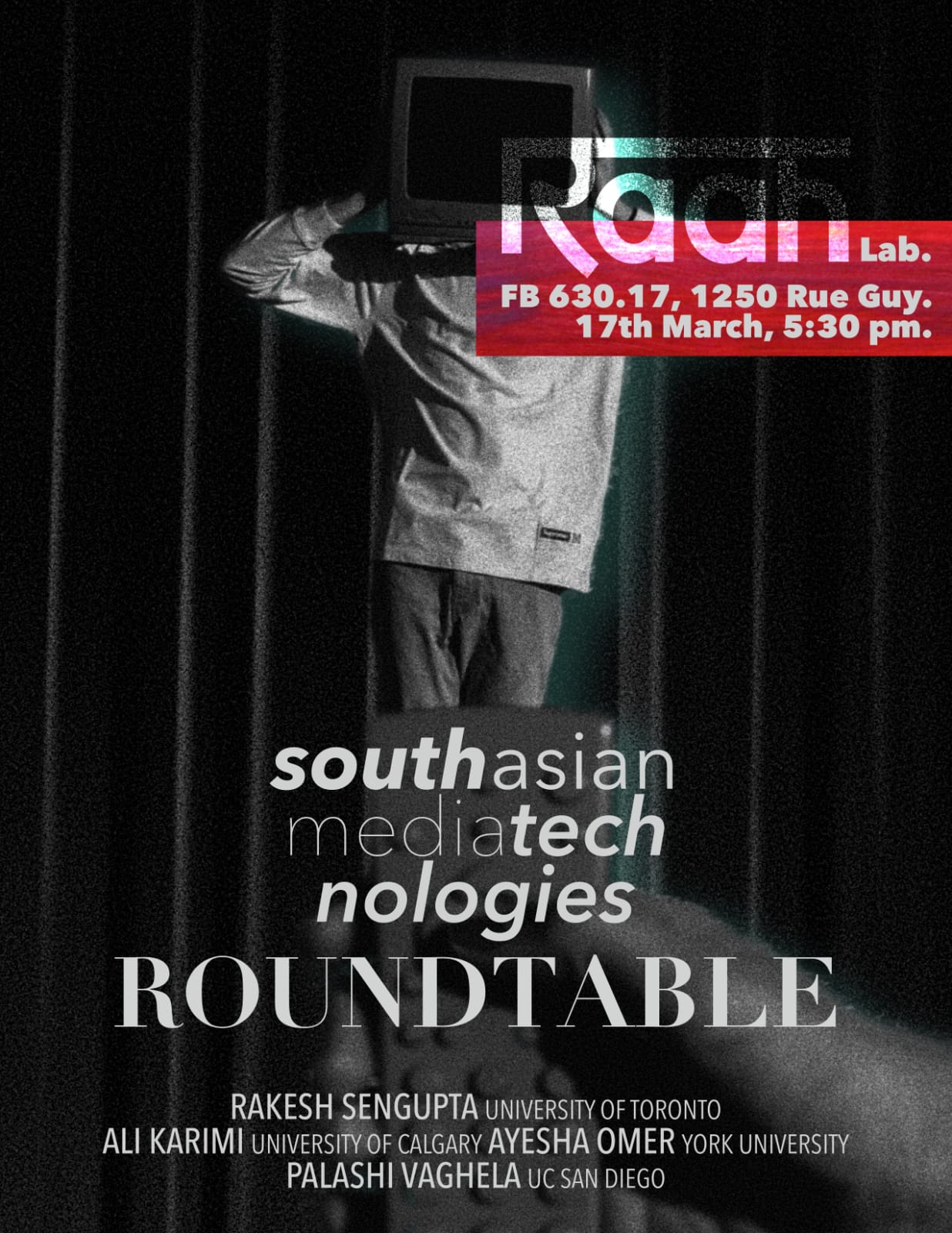
Featured speakers:
Rakesh Sengupta, University of Toronto
Rakesh Sengupta’s research and teaching focuses on South Asian cinemas, film history, media archaeology, critical theory and global media cultures. His current book project, An Archaeology of Screenwriting: Archives, Practices and Epistemes of Indian Cinema, 1930-1960, plots the history of screenwriting in South Asia outside Western epistemological frameworks of cinema. His work interrogates universalist ideas of film archives, aesthetics and audiences to imagine an alternative history of the medium and offers a decolonial model of film historiography from the Global South. His research is based on historical materials in four languages across formal and informal archives in several countries, as well as interview-based fieldwork in Mumbai.
Ali Karimi, University of Calgary
Ali Karimi is an Assistant Professor and Canada Research Chair (Tier II) in the Department of Communication, Media and Film at the University of Calgary. He is a scholar of critical information studies with a focus on surveillance, privacy, and data justice. Karimi’s current research examines the power politics of how the state produces, organizes, and uses population information. He studies this problem mostly in the context of the weak states of the Global South where data is often contested and information injustice is a major issue—a problem that particularly hurts marginalized groups. He is currently working on a book about the history of counting in Afghanistan. The book shows how numerical information—or lack thereof—can affect the state, society, and the market at large. Grounded in the intersection of media studies and STS, this project is based on unexamined archival sources from Afghanistan and several other countries and ethnographic fieldwork. Karimi received his PhD from McGill University, where his research was supported by a Vanier Canada Graduate Scholarship. Before joining the University of Calgary, he was a postdoctoral fellow at the Centre for Advanced Research in Global Communication, Annenberg School for Communication, University of Pennsylvania.
Ayesha Omer, York University
Ayesha Omer is an Assistant Professor of digital anthropology at York University. Her interdisciplinary scholarship broadly examines how infrastructure technologies mediate sociopolitical life. Her book project, Networks of Dust: Media, Infrastructure, and Ecology along the China-Pakistan Economic Corridor, explores issues of technological mediation, political sovereignty, and climate justice across China’s network of digital energy, communications, and logistics infrastructure in the indigenous borderlands of the Pakistani state, as part of the global Belt and Road Initiative (BRI). Her research draws on multi-sited ethnographic fieldwork, research in Pakistani state archives, visual analysis of digital Chinese and Pakistani media content, CPEC policy documents, and has been supported by several grants, including the American Association of University Women (AAUW) International Doctoral Fellowship and the Global Dissertation Fellowship at NYU Shanghai.
Omer completed her Ph.D. from New York University and held post-doctoral fellowships at the Society of Fellows in the Humanities at the University of Southern California, and the Center for Advanced Research in Global Communication at the Annenberg School of Communication, University of Pennsylvania. She has a background in mixed-media and public performance art, and her writing has appeared in or is forthcoming in publications such as, ArtNow, Cityscapes, Tanqeed, Cultural Studies, the Palgrave Handbook on New Directions in Kashmir Studies, and the SAGE Handbook of Data and Society, among others.
Palashi Vaghela, UC San Diego
Palashi Vaghela is a President’s Postdoctoral Fellow at University of California, San Diego. In June 2025, she will be joining Simon Fraser University as an Assistant Professor and Canada Research Chair for Technological Inclusion in the School of Interactive Arts and Technology. Vaghela got her PhD in Information Science at Cornell University with a minor in Feminist, Gender and Sexuality Studies. She is an engineer turned feminist scholar, researcher, writer, poet, and activist working at the intersection of society and technology.
"I think a lot about what is considered normative and what is normalized in worlds of computing, including where it comes from and how it becomes common sense. To this end, I am often pursuing alternative understandings of computing that challenge or resist such norms. I am guided by historical, material and corporeal knowledge of marginalized communities to question as well as re-imagine worlds of technology."